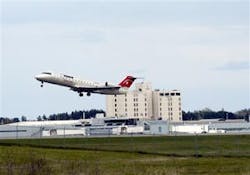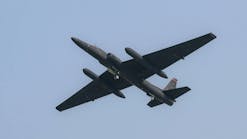BANGOR, Maine (AP) -- Officials are fighting to make sure the light is always on at the control tower at Bangor International Airport, which is playing a prominent role as a safe haven for planes diverted because of suspicious passengers.
Twice in less than a week, Boston-bound international flights have been diverted to the airport because a passenger's name appeared on a no-fly list.
Bangor is the first large U.S. airport for incoming European flights, and it's the last U.S. airport for outgoing flights, providing a safety net for aircraft with uncluttered skies and one of the longest runways on the East Coast.
Officials who want Bangor to remain a beacon worry about a Federal Aviation Administration proposal to scale back hours for the control tower.
Maine Sen. Susan Collins said the back-to-back diverted flights underscore the need to keep the control tower open 24 hours a day. The FAA proposal unveiled earlier this year would have the tower close between midnight and 5 a.m.
''Under the FAA's proposal, aircraft approaching the U.S. in the early morning hours would not have the ability to be rerouted to Bangor,'' she said.
FAA spokesman Greg Martin said no final decisions have been made on the hours of operation of the control tower at Bangor and other airports. He suggested the diverted flights will come into play during the FAA's evaluation.
''That's Exhibit A on why we conduct a careful evaluation before we take action,'' Martin said from his office in Washington.
When a plane is diverted, airport workers spring to action, making preparations to deal with the planes and their passengers. The FBI, Transportation Security Administration, immigration officials and local authorities remove the passengers for questioning.
Airport officials say there's no fuss.
''We're so used to it,'' said Bob Jarvis, the airport's operations manager, who fielded dozens of phone calls from news reporters during the latest episode Tuesday. ''We handle it like any other one and get it back in the air.''
The Bangor airport, created from the former Dow Air Force Base, used to be a lot busier when it served as a refueling stopover for 4,500 to 5,000 international charter flights a year in the late 1980s and early 1990s, Jarvis said.
But activity slowed as newer, long-range jetliners gave airlines the ability to fly right over Bangor without stopping to refuel.
Then it made a splash as a place where pilots could drop off unruly passengers. And during the first Gulf War, the airport distinguished itself by having residents greet aircraft carrying U.S. troops, no matter the hour.
These days, the airport's location has given it another prominent role after the Sept. 11, 2001, terrorist attacks.
All told, there have been a total of seven international flights diverted because of a potential match of a passenger with a name on the federal no-fly list since the 9-11 attacks, said Ann Davis, a TSA spokeswoman in Boston.
Of those seven, four have been diverted to Bangor. One of those was the highly publicized episode involving singer Cat Stevens last September.
Federal law requires airlines to transmit to the Homeland Security Department the passenger lists for flights bound for the United States within 15 minutes of takeoff. Officials then check the names against terrorist watch lists.
Collins and Democratic Sen. Joseph Lieberman of Connecticut sponsored legislation that directed the Department of Homeland Security to run checks before planes take off. But the DHS is three months behind schedule in coming up with a plan.





